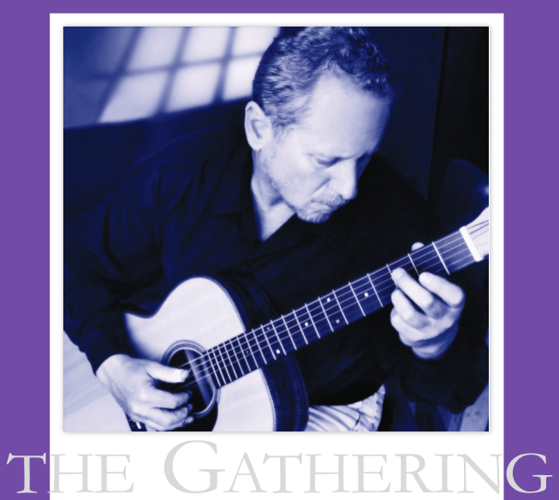Will Ackerman is a bundle of contradictions that merge somehow into a brilliant, Grammy-winning guitarist who’s a mentor to up-and-coming musicians.
His gifts for music and mentoring were on display Saturday, Nov. 22 at the Spruce Peak Performing Arts Center in Stowe.
Ackerman, who’s 64, became a giant in acoustic music — new age, with elements of classical, jazz and folk — because of his own musicianship (with 14 of his own albums released between 1976 and 2010) and his knack for bringing out the best in the artists whose albums he produced at Windham Hill Records in southern Vermont.
He founded the company in 1976 and ran it for two decades. It was a great business success for Ackerman, and for the artists he recorded.
Among Ackerman’s innovations was the sampler album, a CD with snippets — typically 60 to 90 seconds — of music from artists whose records he produced. The samplers introduced listeners to musicians they’d never heard, but might be interested in.
The music business has changed markedly since those days, with downloads, streaming services and mobile devices the main ways that people acquire music.
But Ackerman loved the idea of the sampler album, and The Gathering concerts he’s headlining offer the same experience, only live. Ackerman uses his reputation to help promote the careers of excellent musicians who often aren’t well known.
“The notion of creating something greater than the sum of its parts is what we are doing,” Ackerman said in an interview.
“The Gathering” is the title of a landmark 2012 album featuring 22 artists whose albums were produced and recorded at his Imaginary Road Studios. The studio is just north of Brattleboro, where he lives. Last month, “The Gathering II,” featuring 21 up-and-coming artists, reached No. 1 on the new age/ambient/world music top 100 radio chart (zonemusicreporter.com).
The Stowe concert
Expect the music to be heavily acoustic and fairly introspective.
“I think people who enjoy this sort of thing feel a very deep emotional connection,” Ackerman said in an interview.
He’s received thousands of letters and emails from people touched by his music. People tell him that their husband, wife, brother or sister chose to listen to his music as they lay dying.
“I’m so overwhelmed that they would find solace in my music,” he said. “It’s the greatest compliment anyone could pay me.”
Others have said his music provided the soundtrack for their wedding, or the birth of their children — and, he figures, the conception of those children.
He had this rule for producing music at Windham Hill: The music truly had to move him. “If not, we didn’t record it,” he said.
“I love musical talent, but I will take heartfelt music over gymnastics or sheer ego anytime. Obviously, you’re looking for a combination — a distinctive musical voice, and music that connects to people emotionally. Not academic, or sheer gymnastics; it’s about communicating emotions to other people.”
About those emotions
Ackerman knows a thing or two about emotions, about trouble, about feeling lost.
“My mother committed suicide when I was 12,” he said. “She was manic-depressive. It was not a blissful childhood.
“After that, I was a very lost little boy.”
His father, head of the English department at Stanford University, had a colleague who ran summer trips into the High Sierras, where young people built trails for the U.S. Forest Service in places like Yosemite National Park and Stanislaus National Forest.
Ackerman would spend six weeks at a time out there, living in a tent, seeing very few people.
“You were really on your own,” he said. “I found a place to belong in those mountains. I found happiness and peace. It literally saved my life.
“The fact that I became a positive, productive person had as much to do with connecting with nature as anything else.”
Along the way, he found touchstones that keep him connected to nature. He goes surfing for a month every year. He hikes in Death Valley every year. For 52 straight years, he has climbed Mount Whitney in California — at 14,505 feet, it’s the highest peak in the lower 48 states.
“These touchstones were my salvation, what allowed me to survive as a person,” Ackerman said. “I still need those things. It’s not a compulsion; it’s joy, revisited.”
Here’s how important: He had heart surgery in September 2011. Two months later, he climbed Mount Whitney again.
Before the interview with the Stowe Reporter, Ackerman had been working all day on a deck project.
“I just wrote this to a close friend today — if I never played another note of music, it wouldn’t break my heart, but if I couldn’t be out with my chain saw, bucking wood —without that, I think I would feel rudderless and purposeless. Work has always been my salvation.”
Home-builder
Ackerman took a circuitous route to music guru. He quit Stanford moments before graduation and got a job building houses. After a while, he struck out on his own.
Meanwhile, he had started Windham Hill Records, but it wasn’t much in the early days. His business card in 1980 said: Windham Hill Builders/Records/ Music BMI.
“I don’t remember any sense that this was going to be my primary business,” he said of record producing.
Then things happened. A kid who’d been his next-door neighbor, who had put a guitar into his hands for the first time, had grown up to be the manager of Creedence Clearwater Revival.
“I gave him my record, and the next thing I know eight major-market stations are playing my record. The thing just took off like crazy. Who would have thought you could make any money selling piano and guitar solos?”
About his own music, Ackerman looks at himself as more of a mechanic than a brilliant artist. The melodies come from within — Ackerman doesn’t read music.
“What I do is difficult because of its sheer simplicity and space; every note has to be nuanced,” Ackerman said. “I’m proud of what I can do. But I also produced Michael Hedges and Alex de Grassi, which provides some perspective — having watched that great innovator, Hedges, and de Grassi, the just insane complexity of composition and performance.”
Building for the future
These days, Ackerman sticks with things that interest him. He’s 64 now; he has made his mark and has nothing left to prove, really.
He stopped touring altogether some years ago, but last winter he played a few concerts in Hawaii and had a great time. Then he struck on the idea of making “The Gathering” not just an album, but a real, live way to help the careers of fine musicians.
“We are going to do more of this, with many more artists,” he said. “I’m amazed at how many emails I got from people saying they didn’t know where I’d gone, and now I have a body of 40 new people I love. It’s a tough market these days, but I’m cautiously optimistic this is going to work.
“My wife thinks I’m working a little too hard, but I love it, and pardon me if I sound egotistical, but I feel better at it than ever,” Ackerman said.
One of the best things about age, he said, is that “ego is really not involved in it anymore. You feel that you’re in service to these people and their music. I’m so conscious of the fact that the ego is all gone — it’s very liberating. Maybe I am older and wiser.”






(0) comments
Welcome to the discussion.
Log In
Keep it clean. Please avoid obscene, vulgar, lewd, racist or sexual language.
PLEASE TURN OFF YOUR CAPS LOCK.
Don't threaten. Threats of harming another person will not be tolerated.
Be truthful. Don't knowingly lie about anyone or anything.
Be nice. No racism, sexism or any sort of -ism that is degrading to another person.
Be proactive. Use the "Report" link on each comment to let us know of abusive posts.
Share with us. We'd love to hear eyewitness accounts, the history behind an article.